Ex-Iranian Security Official Slams Russia's Lack Of Support In Israel Attack
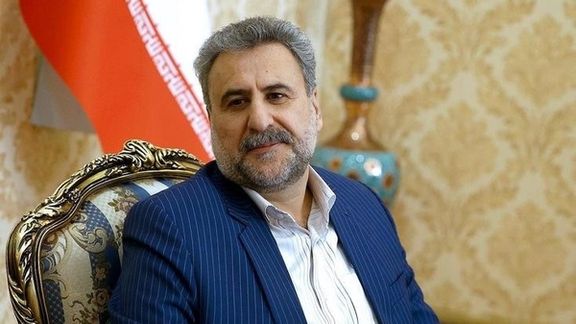
The former head of the Iranian parliament’s National Security Committee has criticized Russia's refusal to defend Iran's attack on Israel this week.

The former head of the Iranian parliament’s National Security Committee has criticized Russia's refusal to defend Iran's attack on Israel this week.
Heshmatollah Falahatpisheh said that while global powers such as the US and UK quickly mobilized to intercept Iran's 350 plus projectiles launched Saturday night, no significant support came Iran's way, not even from Russia, who Iran has provided with support for its war on Ukraine.
“The developments showed that Iran is alone in the region. The world's powers came to Israel's aid to reduce the aerial pressure on Israel, but other powers did not come to Iran's aid even in wartime conditions. Russia was not willing to provide Iran with the necessary equipment in recent times.”
The comments echo Falahatpisheh's earlier criticisms of Russian policies. In January, he accused Moscow of seeking a 'partner in crime' for its actions in Ukraine, referring to Iran's provision of suicide drones to Russia.
Since October 2022, Iran has supplied drones to Russia, which have been used to target infrastructure and civilian areas in Ukraine. These drones, employed alongside missile strikes, aim to overwhelm Ukrainian air defenses.
Despite initial denials from Iran about supplying Shahed kamikaze drones to Russia, the Iranian government eventually acknowledged sending a limited batch before the Ukraine conflict escalated.
Since initiating its invasion of Ukraine in February 2022, Russia has boosted its military cooperation with Iran.
Critics are increasingly expressing doubts about Russia's dependability as an ally to Iran, especially concerning nuclear issues and broader foreign policy concerns.
In November, the Kremlin stated that Russia and Iran are progressing in their relationship, emphasizing their collaboration in "military-technical cooperation."
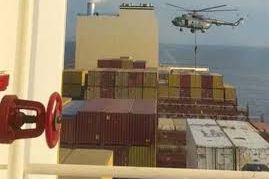
Iran claims that it is “evident” the vessel captured in the Strait of Hormuz by the Revolutionary Guard belongs to Israel.
"The ownership of the ship by Israel is evident," stated Nasser Kanaani, the spokesperson for the Ministry of Foreign Affairs on Monday.
"Given the violation of maritime laws by the concerned ship, it has been directed into the territorial waters of Iran," added Kanaani during his weekly briefing.
On Saturday, Iran's Revolutionary Guard seized a cargo ship that they said was "affiliated with" Israel near the Strait of Hormuz.
The UK Maritime Trade Operations (UKMTO) said the event occurred 50 nautical miles northeast of Fujairah in the United Arab Emirates.
Tasnim news agency, which is close to the IRGC, said that the vessel, MSC Aries, is owned by Israeli billionaire Eyal Ofer.
IRNA labeled Ofer as “the Zionist capitalist.” In November, vessels part-owned by him were targeted by Yemen's Houthi forces, who are aligned with Iran.
In their statement, Zodiac Maritime confirmed the seizure, adding that the “MSC is responsible for all vessel activities including cargo operations and maintenance. Title to the vessel is held by Gortal Shipping Inc as financier and she has been leased to MSC on a long-term basis. Gortal Shipping Inc is affiliated with Zodiac Maritime.”
The US State Department has condemned the seizure and called for the immediate release of the ship and its crew. In a statement of response, Israeli Minister of Foreign Affairs Israel Katz called on the European Union and the entire world to “immediately declare the IRGC as a terrorist organization and sanction Iran now.”
Hours after the seizure Iran attacked Israel with 350 drones and missiles launched on Saturday evening, following an airstrike on April 1 that targeted the Iranian consulate in Damascus and killed several IRGC members, including two high-ranking commanders.
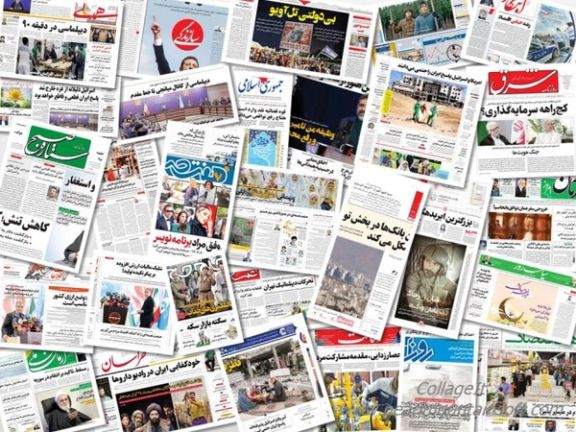
The Iranian government has taken legal action against a number of newspapers and influential journalists who failed to reiterate its rhetoric regarding the attack on Israel in their publications.
Prominent 'reformist' commentator Abbas Abdi, investigative journalist Hossein Dehbashi, and whistle-blower Yashar Soltani, who recently exposed a prominent cleric's corruption, have been accused of “compromising national security" following their comments regarding Iran's attack on Israel's soil.

The punitive measures extend beyond journalists to include citizens. On Sunday, the Islamic Revolutionary Guard Corps (IRGC) threatened to take action against any online expression of support for Israel.
The Iranian government launched over 350 drones and missiles into Israel on Saturday night in retaliation for an airstrike on its consulate compound in Damascus on April 1, for which they blamed Israel. Several members of the IRGC, including two top commanders, were killed in the attack.
In spite of regime celebrations of the attack, Abdi remained outspoken, claiming, "Contrary to popular belief, I believe that Israel's attack was a reaction which does not require Iran's response and reaction."
Over 700 journalists have been arrested since the 2022 uprising with more crackdowns expected in the wake of the bombardment, Iran among the world's least safe places for journalists. At home and abroad, the regime has sought to silence voices of dissent, including attacks on Iran International journalists abroad.
Follow developments on Iran International's Live coverage of ongoing tensions between Iran and Israel.
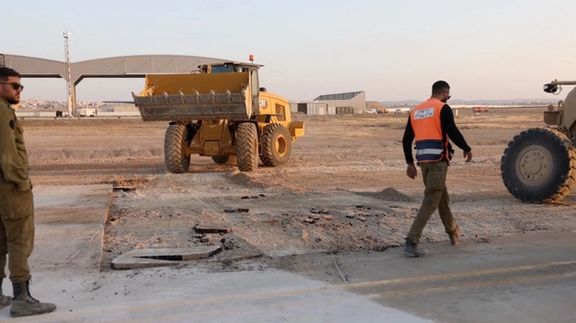
In its attack on Israel, Iran launched more than 300 killer drones, cruise missiles, and ballistic missiles on Israeli territory, IDF spokesperson Rear Admiral Daniel Hagari confirmed this weekend.
The unprecedented attack on Israel -- the territory of a key US ally -- though anticipated, was unparalleled.
Contrary to the Islamic Republic’s armed forces chief, who claimed the attack “achieved all its objectives,” the IDF spokesperson reports that 99% of the threats were intercepted by the air defense system, resulting in negligible impact.
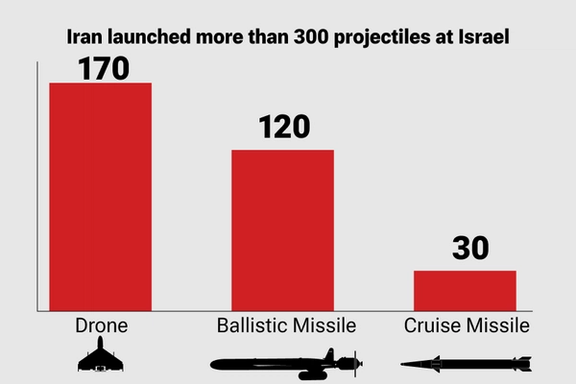
On April 12, at approximately 9:33 pm London time, Tehran confirmed the initiation of its attack.
A wave of drones was dispatched from Iran, some 1200 kilometers away, towards Israel.
An Iranian Shahed 136 Drone, with the maximum speed of 185 k/h takes hours to cover a distance of 1200 kilometers -- suggesting that Israel had a heads-up several hours in advance. Missiles were launched almost an hour later, according to the Islamic Revolutionary Guards (IRGC).

The Iron Dome is commonly recognised as Israel's primary defense against missiles and rockets. But, Israel's defense shield consists of five layers -- with the Iron Dome counting as one. In preparation for such an attack, Israel has been developing its air defense system for the past 15 years.
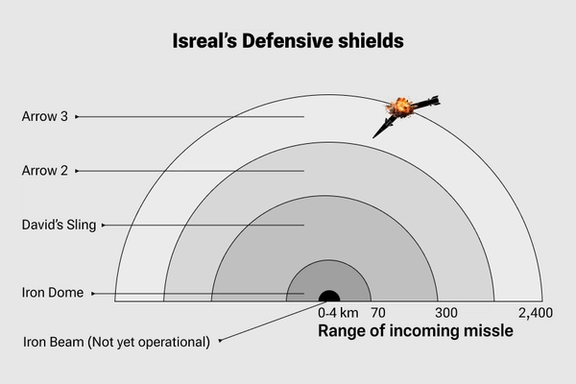
Its first tier, the Iron beam, destroys the projectile with a pillar of laser light. Like the Iron Dome, its detection radar becomes active, and the laser gun targets the objective. It is used for short-range missiles and artillery shells. It fills the blind spot of the Iron Dome. According to the IDF it is yet to be operational.
The second tier, the most renowned, is the Iron Dome. When a rocket is fired towards Israel, the rocket radar detects and tracks it. The control system estimates the impact point, and finally the nearest launcher engages and launches a missile towards the rocket. The success rate of the Iron Dome system is close to 96%, meaning out of 100 rockets, 4 of them may hit Israeli soil.
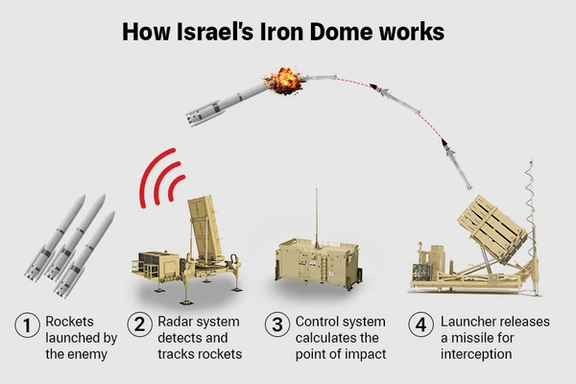
David's Sling: Israel’s military system named after the biblical story of David and Goliath. This third tier can target drones, aircraft, medium to long-range missiles, ballistic missiles, and cruise missiles covering ranges from 40 to 300 kilometers. It has the capability to provide coverage for all of Israel from a single point. David's Sling was responsible for shooting down the Hamas Ayyash 250 rocket on October 13, 2023.
According to the IDF, the Israeli Air Force and its allies successfully intercepted and destroyed all 170 drones and 30 cruise missiles outside the country's borders.
Of the 120 ballistic missiles that crossed into Israeli airspace, the IDF reported that the long-range Arrow air defense system successfully intercepted the overwhelming majority.
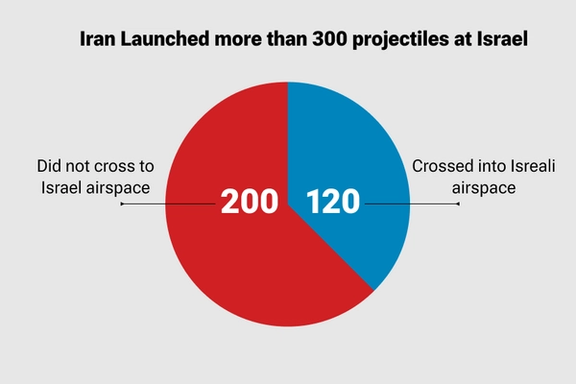
Arrow 2 and Arrow 3, considered the top tiers of Israel’s multilayered air defenses, complement each other, and track and destroy missiles and rockets with ranges up to 2400 kilometers.
The second factor contributing to the limited impact came from Israel's allies: fighter jets stepped up to boost interception capabilities.
Reports indicate that jets from the US, UK, France, and Jordan formed a robust barrier against the onslaught of drones and missiles from the Islamic Republic.
US forces hit over 80 one-way attack drones, US Central Command (CENTCOM) said on Monday – meaning that the US downed 47% of Iran’s launched drones.

This was the first-ever attack from Iranian soil on Israel.
An attack that diverted attention from the Gaza war towards the Islamic Republic and united the international community in support of Israel and condemnation of the Iranian government.
Now, as the IRGC authorities declare the conclusion of their operation, Israel asserts that the battle is far from over, hinting at a forthcoming retaliation against the Islamic Republic.
But, for the time being Israel’s next move remains uncertain.
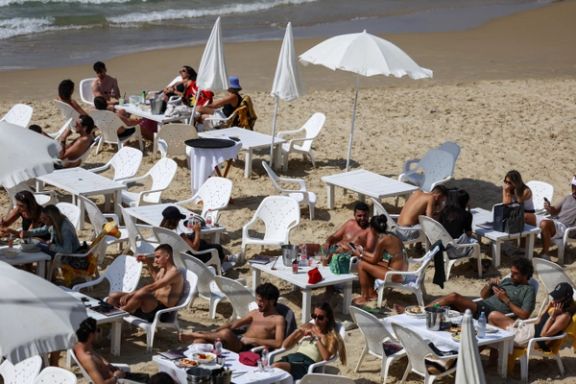
Israel's military announced that life would resume as normal on Monday in the wake of the Iranian missile and drone onslaught.
Schools were ordered to return and gatherings were given the green light in safe areas not affected by the Gaza war and Hezbollah bombardments in Israel's north.
"Following a situational assessment, it was determined that as of 00:00 Israel time tonight (Monday), changes will be made to the Home Front Command’s defensive guidelines," the announcement from the IDF said.
Initial warnings had braced the country for several days of possible strikes with many in the country working from home and postponing meetings awaiting new instructions.
On Saturday, Iran launched hundreds of projectiles towards the Jewish state in retaliation for an alleged Israeli airstrike on its consulate compound in Damascus this month.
The strike killed a top IRGC commander, the highest ranking assassination since the US killed Qassem Soleimani in 2020, along with several other IRGC top brass.
Iran's attack was the first time Tehran gave the command to strike Israel from Iranian soil, usually commanding its proxies in the region to act. In the wake of the Iran-backed Hamas attack, Israel has come under fire from Iran's militias in Gaza, Lebanon, Syria, Iraq and Yemen as the regime continues its bid to annihilate the Jewish state.
The aerial bombardment was deemed a failure in the West as Israel was joined by its allies the US, UK, France and even Jordan, to intercept the attacks, 99 percent of which was foiled. Multiple projectiles were also launched by proxies alongside the Iranian attack, but there were no deaths. One seven-year-old girl remains in a critical condition after shrapnel injuries in Israel's south.
In Jerusalem, home to the Muslim holy site at the heart of the Israel-Palestine conflict, projectiles threatened even the most treasured Al Quds, with Israeli defense systems protecting the Old City.

Mashallah Shamsolvaezin, a renown Iranian reformist journalist, has branded critics of the recent Iranian military strike against Israel as "defenders of the devil."
Shamsolvaezin expressed support for the attack in an interview with the Tasnim news agency, affiliated with the Islamic Revolutionary Guard Corps (IRGC), saying, "Unfortunately, some inside the country have become defenders of the devil, claiming that nothing has happened and that the missiles did not hit at all; they promote and reproduce 99 percent of the Israeli narrative, which is very dangerous."
His remarks coincide with increased pressure from the IRGC on the media and journalists to align with the regime's narrative. On Saturday, the Intelligence Organization of the IRGC urged the Iranian public to report any pro-Israel activities observed online.
Legal action has also been initiated against the Jahan Sanat newspaper and one of its journalists for allegedly "compromising national security" through their coverage of the operation against Israel.
Shamsolvaezin, 66, is a doyen of the Iranian media scene who edited several of Iran's foremost independent newspapers post-revolution, including Kayhan, Jame'eh, Neshat, and Asr-e Azadegan. He is also the spokesperson for the Iranian Committee for the Defense of Freedom of the Press and vice president of the Association of Iranian Journalists. The CPJ International Press Freedom Award winner in 2000, Shamsolvaezin has been to jail many times due to his journalism.
On the military front, Iran's retaliation against Israel involved over 350 drone and missile launches Saturday night, following an airstrike on April 1 that targeted the Iranian consulate in Damascus and killed several IRGC members, including two high-ranking commanders.
Despite the significant number of projectiles being intercepted by Israeli defenses and their allies, the Iranian regime has declared the operation a “success.” Iran's proxies in Iraq and Yemen also participated in the coordinated attack.






